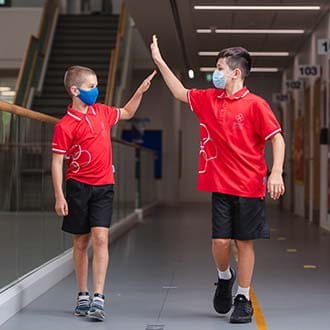We use cookies to improve your online experiences. To learn more and choose your cookies options, please refer to our cookie policy.

In past blogs, we’ve talked about how SISD aims to maintain our students’ health and wellbeing during the pandemic, and the advantages of blended learning through our International Baccalaureate (IB) programme. Here, we’ll dive into 8 things living through COVID has taught children.
During the pandemic, children learned the importance of keeping their hands clean from family members at home, from school, and through the media. Children learned the five steps—wet, lather, scrub, rinse and dry—and when to wash hands, such as after using the bathroom, playing outside, and before eating. The Centers for Disease Control and Prevention (CDC), World Health Organization (WHO), and UNICEF all published guides on how parents can teach children to maintain good personal hygiene and keep COVID-19 out of the home and school. Washing hands is an excellent habit to have, even if COVID was eliminated.
SISD recognises social relationships are an important part of a child’s health, wellbeing, and development. In the past, we’ve recognised play-based learning as one way children can develop social relationships. With the pandemic, students had to rely less on physical interaction with others. We stressed to students how important it was to maintain their social relationships regardless of distance. Students and faculty stayed in touch with long-distance friends and family much more than before through regular Zoom calls and checking in on each other.
In a world where the workforce is increasingly remote, the pandemic will give students the right skill set to succeed beyond graduation. Taking responsibility for their own learning encourages the inquirer learner attribute of the IB programme, which gives students the necessary skills to conduct inquiry and research, and learn independently. Students are encouraged to enjoy learning and this enjoyment will hopefully be sustained in other parts of their lives. Remote and independent learning also encourages reflection, the learner attribute that gives thoughtful consideration to students’ own learning and experience. They’re able to assess and understand their strengths and limitations to support their learning and personal development.
Caring is a learning attribute, in which students show empathy, compassion and respect towards the needs and feelings of others. We encourage students to have a personal commitment to service and act to make a positive difference in the lives of others and the environment. During the pandemic, we encouraged children to display their emotional intelligence by showing their support for healthcare workers. For example, they drew rainbows to display on their windows as a sign of support and gratitude.
The pandemic created many challenges, including the unpredictability of day-to-day life. Students and staff alike became resilient and adaptable, both of which are valuable skills. Each family faced a responsibility to face risk; risk-taking is another IB learner attribute in which students approach unfamiliar situations and uncertainty with courage and forethought. Undoubtedly, living a part of their school lives during a pandemic will give them the independence of spirit to explore new roles, ideas, and strategies in their lives. Risk-taking also encourages students to be brave and articulate in defending their beliefs.
Stuck indoors, children had to find new ways to keep themselves entertained. Many of our students discovered new interests and hobbies. Creativity encourages the inquirer learning attribute in which students develop their natural curiosity, and the thinkerattribute which helps students exercise initiative in applying thinking skills critically and creatively to recognise and approach complex problems and make reasoned, ethical decisions.
To get through this difficult time, everyone had to lean on each other for support. With that, children learned the importance of family and friends in difficult times, which will further encourage development of the caring attribute.